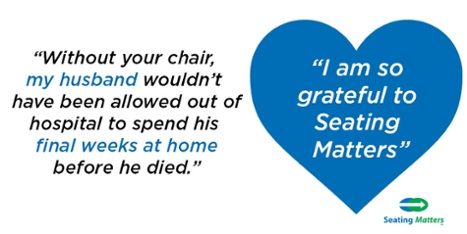Palliative care can be required by adults and children alike who face a terminal illness with no known cure.
Last year the All Ireland Institute of Hospice and Palliative Care (AIIHPC) conducted a survey, which found that more than half of adults surveyed (52%) have only a basic or minimal understanding of what palliative care involves.
The survey found that 34% of people were not aware that palliative care may be suitable for a number of years, while 20% were not aware that the approach also supports family, friends and carers during an illness and afterwards.²
Palliative care can be given at home, hospital, in a hospice or long term care facility. It is important for families and carers to note the patient’s wishes and so conversations need to take place whilst the patient is able to communicate their thoughts.
End of life care is an important part of palliative care for people who are nearing the end of life. End of life care is for people who are considered to be in the last year of life.³
End of life care aims to help people live as well as possible and to die with dignity.
One survey carried out in Australia asked dying patients what were the most important things to them?⁴
The top four answers were very simple answers:
1. Being in the Place of Their Choice.
70% of palliative care patients would prefer to die at home.
We often hear of patients who cannot be discharged from hospital until they have the correct equipment at home. In the final days we have to spend with loved ones these moments are absolutely precious. Families and patients don’t often have the luxury of time to wait for Seating Assessments or long delivery times. When I started Seating Matters this was one of my key goals – to ensure a fast turnaround of equipment to help those in need. In palliative care circumstances, we endeavour to see patients as quickly as possible to complete their Seating Assessment often within as little as a few days, or evenings and weekends if it suits.
2. Being Pain Free.
Effective pain relief management or various other symptoms management such as vomiting and nausea is very important to patients and their families during palliative care. It is important that the patient is as comfortable and relaxed as physically possible and having the right equipment, such as specialist seating, can really help. We often associate being in bed with being sick. When we can get loved ones up from bed and into a chair which is comfortable, supportive and meets their needs, this can really help with social interaction, keeping spirits up and has a positive effect on mental health as well as physical health. Seating Matters chairs have been thoroughly clinically trialled and proven to reduce pressure injuries (bed sores) which can cause debilitating pain
3. Being Able to Enjoy Their Last Few Days.
What are the things the patient enjoys most? Being outside with the sun shining on their face? Listening to their favourite music? Talk to the patient and learn what would make them happy in their final days and see if this is something that can be arranged. It is always the simple things people seek at this point in their life.
4. Having Those Close to You Supporting You.
If patients can be surrounded by their family during their final months/weeks/days it can bring a sense of comfort and fulfilment in their final moments.
An important part of palliative or end of life care is providing support for the patient and for their families.
This support can take on many forms, from emotional support to financial support. Mental and physical health and wellbeing are often intricately linked and it’s important that caregivers look after their own health as well as the patient’s. It’s also very important for family carers that they have a support network to provide any assistance they need as they go through a tough time caring for their relative and having to make tough decisions.
Having the correct information to hand will aid decision making and will keep all parties informed about their options.

We want to ensure everyone who needs a chair to bring a relative home can get a Seating Assessment as soon as possible and we offer the option of Fast Track Delivery to speed the manufacture and delivery process up significantly.
If you have a patient in mind who we can help please get in contact today.
Remember that the quality of their chair determines the quality of their life. Never underestimate the impact of correct therapeutic seating in optimising comfort and reducing pain for palliative care patients, allowing them to be surrounded by family at home or in the place that matters to them most, as they live out their last days on earth. Our Seating Specialists are on hand to provide you with the information you need in order to give you confidence in your decision. They do this in an easy to understand format to give you comfort knowing that you have provided the best you can for your patient or loved one in their time of need.
If you have a patient in mind who we can help please get in contact today.
References
- World Health Organisation
- http://aiihpc.org/
- https://www.mariecurie.org.uk/help/terminal-illness/diagnosed/palliative-care-end-of-life-care#endoflifecare
- http://palliativecare.org.au
** This post was originally published on http://blog.seatingmatters.com/providing-comfort-during-palliative-care


